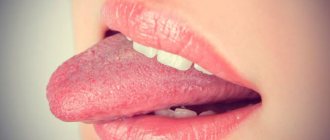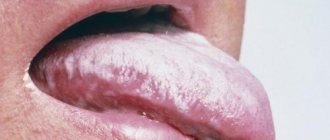Bitterness in the mouth may indicate problems with the digestive system. Severe or persistent bitterness in the mouth is a reason to consult a doctor.
From time to time you may experience an unpleasant bitter taste in your mouth. As a rule, this is due to a sudden release of bile into the gastrointestinal tract. In this case, some bile may enter the esophagus and cause a bitter sensation in the mouth.
. Often a bitter taste in the mouth is felt in the morning, since bile can enter the stomach during sleep (especially if you sleep on your left side and dinner included fatty foods).
Bile is a secretion produced by the liver and is necessary for digesting food. The bile duct carries bile from the liver to the gallbladder, which acts as a storage reservoir. During the active digestive phase, bile from the gallbladder enters the duodenum. Some substances have choleretic properties, that is, they increase the production of bile. Eating foods with choleretic properties (for example, pine nuts) can provoke a sharp increase in the flow of bile into the intestines and, as a result, the appearance of bitterness in the mouth. Some medications have the same effect - both medical preparations and traditional medicine (St. John's wort, sea buckthorn oil, etc.).
However, bitterness in the mouth should not be ignored
. Its appearance indicates that not everything is in order with the digestive system. For example, a bitter taste may appear after eating fatty (heavy) foods. Fatty foods stimulate bile secretion. Normally, the secreted bile should not enter the stomach and esophagus, but should be released exactly as much as is necessary for the digestive process in the intestines. The appearance of bitterness indicates that this is not the case. And we need to figure out what caused this. If bitterness in the mouth occurs frequently or persists for a long time, then it is better not to delay a visit to the doctor.
general characteristics
A pathological disorder of taste perception is called dysgeusia.
Such a “perversion” of taste sensations can be a sign of the development of neurological, hormonal, mental disorders and other diseases, including those caused by a deficiency of certain substances in the body. If the taste of the products remains unchanged, this diagnosis can be excluded. In this case, we are talking about the temporary persistence of an unusual taste in the mouth, and most often the problem disappears when the cause of its appearance is eliminated.
Method number 3. Carry out daily oral hygiene carefully
If you use a stiff bristle brush, electric toothbrush, floss, toothpicks, or even a waterpik, and are overzealous in your daily routine, this may explain why you have a metallic taste in your mouth.
Brushing too vigorously can cause injury to the mucous membranes.
All of the above hygiene products can injure the mucous membranes and gums, causing blood and an unpleasant characteristic taste to appear in the mouth. You can get injured if you handle the devices carelessly, use the wrong technique, or apply strong pressure to the brush. You can also damage delicate tissues if you use devices contrary to contraindications (for example, exacerbation of gingivitis and periodontitis, sensitive gums, rehabilitation period after surgery on soft tissues of the oral cavity).
Read the article on the topic “5 Tips for Safely and Effectively Brushing Your Teeth with an Electric Brush.”
To avoid this problem, consult your dentist about what personal hygiene products you can use depending on the clinical situation in your oral cavity.
Causes of taste in mouth
Throat diseases may be accompanied by an unpleasant taste in the mouth.
Photo: imagepointfr / Depositphotos Reasons for an unusual taste in the mouth may include:
- diseases of the teeth, gums and oral mucosa;
- pathologies of the ENT organs (nasopharynx, paranasal sinuses);
- unbalanced diet;
- diseases of the stomach and gall bladder;
- hormonal and neurological disorders;
- intoxication with chemicals.
In women, a change in taste can be a sign of pregnancy; in men, it is rarely associated with physiological conditions and hormonal surges. At the same time, diseases of the nervous, respiratory systems, or even cancer can lead to the development of symptoms. Doctors will help you understand the cause of the symptom: in this case, an integrated approach to examination and treatment is necessary.
Causes of blood taste in mouth
The characteristic taste of blood most often indicates increased bleeding of the gums. Also, such a taste can be a symptom of diseases of the nasopharynx and paranasal sinuses (sinusitis, frontal sinusitis, sinusitis).
Other reasons for feeling blood in the mouth:
- diseases of the bronchi and lungs (acute bronchitis, pneumonia, pleurisy, lung abscess);
- disorders of the hematopoietic system;
- diabetes;
- renal failure;
- oncological diseases;
- internal bleeding.
In addition, the sensation of blood in the mouth may be associated with diseases of the gastrointestinal tract (GIT):
- esophagitis;
- gastroesophageal reflux disease (GERD);
- chronic gastritis;
- liver pathologies.
The taste of blood may occur due to biting the mucous membranes of the cheeks or tongue. In this case, it is enough to actively rinse your mouth with antiseptic solutions, for example, chlorhexidine, throughout the day.
Causes of bitter taste in mouth
An unpleasant bitter taste may appear in the morning after waking up or several hours after eating.
Common causes of a bitter taste in the mouth:
- Pathologies of the liver and gallbladder (hepatitis, cirrhosis, cholecystitis, cholelithiasis, gallbladder kinks), stagnation of bile - at a certain point, its excess leaves through the bile ducts, enters the stomach and penetrates the esophagus.
- Indigestion. Slowing intestinal motility leads to retention of undigested food in the gastrointestinal tract. This leads to fermentation processes and the appearance of a characteristic taste in the mouth.
- Neurological pathologies (Alzheimer's disease, consequences of traumatic brain injury).
- Pregnancy.
Symptoms can also be caused by hormonal disorders, parasitic infections, or taking certain medications (antibiotics, antiallergic drugs, chemotherapy drugs).
At home you can get rid of the symptom with:
- eating small meals frequently;
- compliance with the water regime;
- rinse your mouth with a spoon of baking soda.
However, after eating, the sensations usually disappear for some time.
Causes of a metallic taste in the mouth
This symptom is often confused with the taste of blood, but other conditions can cause a strong sensation of “metal” in the mouth:
- chemical poisoning with heavy metals (mercury, copper, lead, arsenic);
- taking certain medications (iron supplements for anemia, antiparasitic drugs, pills to lower blood pressure);
- galvanosis - disruption of electrochemical processes in the oral cavity due to metal prostheses, implants, piercings;
- “burning mouth syndrome”, insufficient salivation and dry mouth;
- impaired kidney function (excessive accumulation of metabolic products);
- endocrine diseases (diabetes mellitus, Fig. 1);
- period of hormonal changes (pregnancy, menopause).
The symptom can also appear due to everyday reasons:
- insufficient purification of drinking water;
- storing food in aluminum containers.
To relieve the metallic taste, you can try rinsing your mouth with salt and water, eating foods with intense flavors, and adding more natural spices. It is also important to temporarily switch to cutlery made from non-metallic materials.
Figure 1: A metallic taste in the mouth may indicate a serious medical condition. Source: Verywell Health
Causes of sweet taste in mouth
A sweetish taste that is not associated with an excess of desserts in the diet may be a sign of:
- dental pathologies;
- diabetes mellitus;
- pregnancy;
- problems with the thyroid gland;
- neurological pathologies (stroke, epilepsy);
- GERD (gastroesophageal reflux disease);
- bacterial infections - some microorganisms (streptococci, staphylococci) produce enzymes with a specific taste;
- pesticide poisoning.
You can try to get rid of this feeling by giving up sweets. Also, in the fight against taste, it is necessary to avoid smoking, drink enough fluids throughout the day and carefully observe the rules of oral hygiene.
Causes of acetone taste in the mouth
The reason for this taste and smell of “nail polish remover” from the mouth is most often the excessive content of special substances of fat metabolism - ketone bodies.
As a rule, the symptom appears with diabetes mellitus, but can also accompany other conditions:
- following a keto diet (Fig. 2);
- fasting or drinking too much fluid;
- kidney damage (glomerulonephritis, renal failure);
- excessive alcohol consumption;
- liver pathologies.
Figure 2: Following a keto diet may cause your breath to smell like acetone.
Source: Sewcream / Depositphotos You can get rid of the characteristic smell of acetone using natural breath fresheners, using dental floss and drinking water with lemon.
Important! If you experience a taste of acetone in your mouth, you should reconsider your diet and abandon alternative foods that do not contain sugar - a carbohydrate-free diet often leads to ketoacidosis.
Gastrointestinal diseases
What does bitterness in the mouth mean? There is a very high probability that the culprit is diseases of the gastrointestinal tract, which are accompanied by such a phenomenon as reflux. For example, gastritis, pancreatitis, ulcers, colitis, enteritis. Reflux is the release of acid from the stomach into the esophagus and larynx. To get rid of acid, our salivary glands begin to secrete alkaline saliva, which extinguishes this acid. This saliva has a very bitter taste and is accompanied by heartburn. With such pathologies, the tongue acquires an unhealthy yellowish tint.
With gastrointestinal disease, a yellow coating appears on the tongue and an unpleasant taste
Help before diagnosis
In most cases, the following help to get rid of the symptom:
- keeping the oral cavity clean;
- regular and balanced nutrition;
- cessation of smoking, alcohol abuse;
- drink enough fluid during the day;
- moderate activity after meals.
You can temporarily remove the taste by thoroughly brushing your teeth, rinsing your mouth with water and lemon juice or baking soda, chewing gum, or special mouth fresheners.
When to see a doctor?
Eliminating the cause of the development of a symptom most often completely eliminates all its manifestations, so it is important to consult a doctor in a timely manner (Table 1).
Table 1. Taste in the mouth: when should you seek medical help?
| Type of taste in the mouth | Reasons to see a doctor |
| Taste Blood | If the symptom is not associated with accidental damage to the oral mucosa, you should begin the examination with a trip to the dentist. If necessary, the specialist will refer you to other doctors for consultation. |
| Metallic taste | You need to undergo examination in the toxicology department if the taste appears after poisoning with chemical agents. It is also important to consult a doctor if you suspect bleeding of unknown location or galvanism. |
| Bitter taste | If bitterness in the mouth persists for several days, and is also accompanied by the appearance of plaque, nausea or vomiting, you should make an appointment with a gastroenterologist. This is probably how the body “signals” about disturbances in the gastrointestinal tract. |
| Bitter taste | If your taste changes regularly without connection with the amount of sweets in your diet, you should consult a therapist or endocrinologist. |
| Taste of acetone | You should definitely see an endocrinologist if the symptom occurs due to diabetes. When following a low-carbohydrate diet, it is also important to choose a new diet from a nutritionist. |
Unpleasant sensations in the oral cavity
Sometimes discomfort in the mouth is not manifested by any foreign taste. It happens that people are tormented by manifestations of varying degrees of intensity - from mild irritation to unbearable pain. Let's consider what signals the oral mucosa gives to a person.
Numbness of the mouth
The feeling of dental anesthesia is familiar to many. But what to think if numbness occurs arbitrarily, without visiting a dentist?
If a person’s tongue, inner surface of the cheeks or lips go numb, this may indicate the following ailments:
- Allergy;
- Reflux, in which hydrochloric acid is released into the oral cavity;
- Neuroses, insomnia;
- Disorders of the oral mucosa (glossalgia);
- Mechanical damage;
- Stomatitis, caries;
- Neuropathy due to diabetes;
- Increased cranial pressure;
- Tumors in the head, brain lesions;
- Strokes;
- Osteochondrosis.
Also, numbness in the oral cavity can be caused by migraines, cervical circulation disorders, vegetative-vascular dystonia, lack of potassium or magnesium, and damage to the facial muscles. If you have such a symptom, you need to make an appointment with your local physician, then, if necessary, see a neurologist and endocrinologist.
Diagnostics
The first step in finding the cause of an unpleasant taste in the mouth should be a trip to the dentist: he will immediately determine the possible connection of the symptom with diseases of the teeth and surrounding tissues.
If the problem does not go away, you should consult a therapist: a specialist will help you understand the likely causes of the symptom. For an accurate diagnosis, the results of the following studies may be needed:
- clinical and biochemical blood tests (liver, kidney tests, glucose levels, lipid profile);
- tests to evaluate thyroid function;
- Ultrasound of the abdominal organs;
- fibrogastroduodenoscopy (FGDS);
- pH-metry of the stomach;
- tests for Helicobacter pylori infection;
- electroencephalography (EEG), magnetic resonance imaging (MRI) of the head.
The choice of diagnostic algorithm depends on the most likely cause of the development of an unpleasant taste in the mouth.
Set my teeth on edge
Frequent heartburn and sour belching often accompany pregnancy: the growing uterus puts pressure on the diaphragm, intra-abdominal pressure increases. Those who eat a lot at night also often experience a sour taste in their mouth in the morning. But if these reasons have nothing to do with it, then it is better to deal with this symptom specifically. A persistent sour taste can occur:
Article on the topic
Diagnosis by a drop of blood. Siberian scientists identify potential diseases
for diseases of the digestive tract - often this is a sign of hyperacid gastritis, which is accompanied by increased stomach acidity, or gastroesophageal reflux, as well as gastric ulcer. If, in addition to a specific taste, a person is bothered by pain in the upper abdomen, nausea after eating, heartburn, sour belching, frequent diarrhea or constipation, weakness, it is worth visiting a gastroenterologist. And in order not to guess, you need to do a gastroscopy;
in case of problems with teeth - with caries, gingivitis, periodontitis, in addition to a sour taste in the mouth, there may be toothache, swelling and bleeding of the gums. Hurry to the dentist!
Treatment
The best and most effective method of treating a symptom is to eliminate the cause of its occurrence. If the bad taste in your mouth is caused by a dental problem, it is important to get rid of tooth decay or other diseases as soon as possible.
If an unpleasant taste occurs due to pathology of certain organs and metabolic disorders, the doctor prescribes treatment for the underlying disease.
Conservative therapy
Depending on the characteristics of the symptom, to eliminate it, the doctor may prescribe drugs from the following groups:
- antiseptics;
- antacids;
- choleretic drugs;
- hypoglycemic agents;
- antidotes and detoxification drugs.
The doctor selects treatment individually. The treatment regimen depends on the causes of the taste, its severity, concomitant diseases and other features of the clinical case.
Sometimes, to get rid of the taste in the mouth, you have to resort to medications. Photo by JESHOOTS.com: Pexels
Physiotherapy
Methods of physiotherapeutic treatment in cases of unpleasant taste in the mouth help to cope with chronic inflammatory and metabolic processes, and eliminate other symptoms of pathology.
For example, for diseases of the ENT organs, rinsing with sea salt solutions, ultrasound treatment and UV irradiation, and therapeutic inhalations are used.
Warming procedures are contraindicated for patients with acute conditions - inflammation, likelihood of bleeding, severe pain.
That's the salt!
Article on the topic
Between chocolate and cucumber. What do taste preferences indicate? Most often, saliva becomes salty if a person neglects oral hygiene or simply experiences thirst, which, by the way, may not be felt. Hidden fluid deficiency often occurs due to taking medications, drinking alcohol, coffee, tea, cola, and also due to smoking. Therefore, if you experience such sensations, brush your teeth more thoroughly and drink at least 8 glasses of clean water a day. But if this doesn’t help, you need to figure it out. The causes of a salty taste may include:
infectious and fungal diseases of the nasopharynx - for example, sinusitis: mucus that accumulates in the sinuses can drain into the mouth and cause a salty taste. In this case, consultation with an ENT specialist is necessary;
diseases of the salivary glands , which develop due to the entry of streptococci, staphylococci, pneumococci into the salivary ducts. Go to the dentist!
Continued: Bad taste in the mouth, causes →








